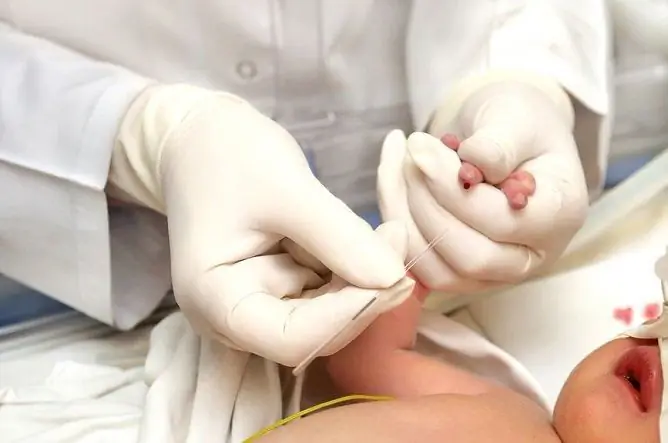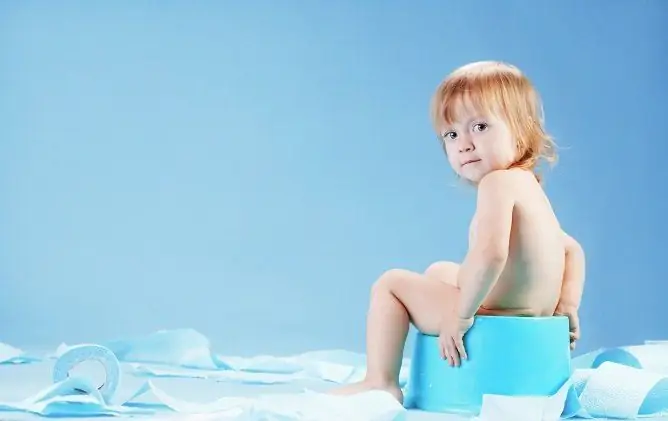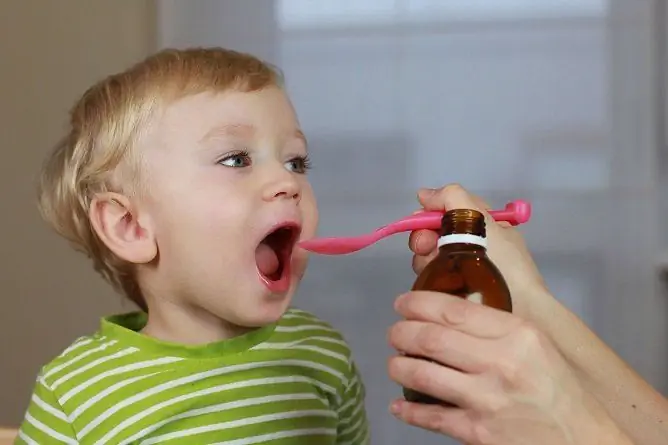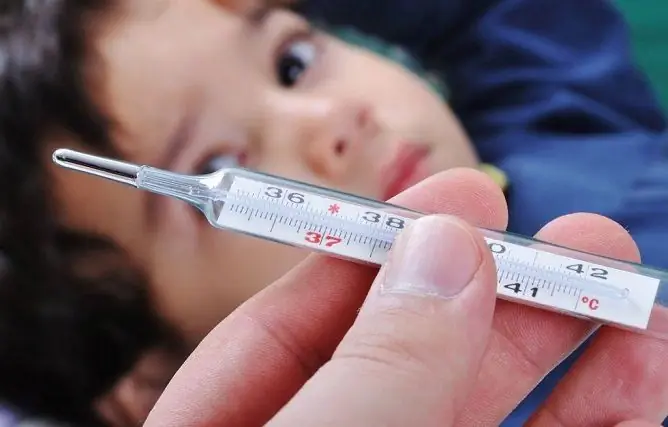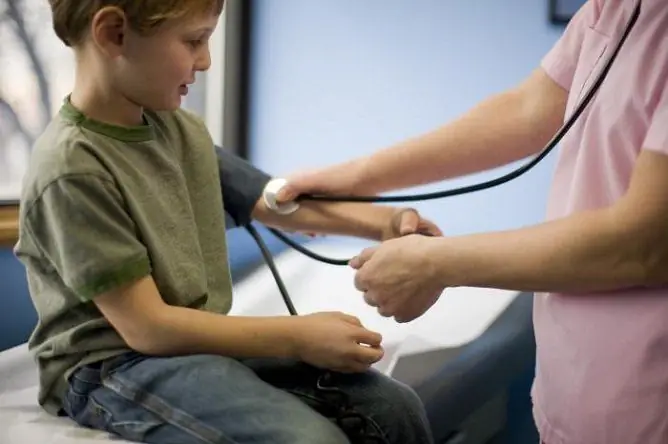- Author Rachel Wainwright wainwright@abchealthonline.com.
- Public 2023-12-15 07:39.
- Last modified 2025-11-02 20:14.
Wet cough in a child: wet or productive cough and how to treat it
The content of the article:
- How a wet cough can manifest itself
-
Treatment of wet cough in a child
- Drug therapy
- Inhalation
- Other methods
- How to treat a wet cough in a child using folk methods
- Video
A wet cough in a child is one of the most common reasons for seeking medical attention, especially during the winter and off-season.
Coughing is the body's defense mechanism to clear irritants from the airways. It should not be ignored, as it can be a sign of many diseases (laryngitis, tracheitis, bronchitis, pneumonia, whooping cough), especially in cases where it becomes stubborn.

Before treating a productive cough in children, you need to establish its cause.
The cough can be dry (non-productive) and moist (wet, productive). The main reason why a child may have a wet cough is the development of an inflammatory process in the mucous membranes of the respiratory tract.
The appearance of a productive cough in a child is a reason to see a doctor; it should not be treated on its own. To make a diagnosis, it is required to collect complaints and anamnesis, an objective examination, laboratory test data, and in some cases also an X-ray examination, bronchoscopy, etc.
How a wet cough can manifest itself
A cough in children may be accompanied by sore throat or discomfort, nasal discharge, nasal congestion, headache, weakness and fatigue, fever, and sometimes choking. In young children, an attack of severe coughing often ends with vomiting.
The nature of sputum in different diseases is different. With bronchial asthma, vitreous sputum is secreted, with pneumonia, sputum may have a rusty tint, with an abscess of the lung, purulent sputum with an unpleasant odor is usually separated, sputum with blood impurities can be separated in tuberculosis, etc.
The respiratory muscles in young children are not sufficiently developed, which causes difficulty in coughing up phlegm. Difficulty sputum discharge can also be observed when the internal lumen of the bronchi is narrowed against the background of inflammation and edema of the tissues. Stagnant sputum in the respiratory tract serves as an excellent breeding ground for bacterial infections, which often complicates the course of the underlying disease.
Special attention is required for a cough, accompanied by shortness of breath, an increase in body temperature above 38 ° C, which lasts longer than 3 days, chest pain, wheezing, lasting more than 20 days, suddenly developed and incessant, as well as a cough in which sputum is separated with an admixture of pus or blood.
Treatment of wet cough in a child
Treatment of wet cough in children is usually carried out at home, but in some cases hospitalization is required - for example, when the cough is a symptom of whooping cough, severe bronchitis, pneumonia. The choice of a treatment regimen depends on the disease, the patient's age, accompanying symptoms, and the presence of contraindications.
Drug therapy
With a wet cough with difficult sputum, the use of drugs to thin the mucus and remove it from the respiratory tract is required. For these purposes, expectorant, mucolytic agents can be used.
Also, with this type of cough, drugs can be prescribed that improve sputum discharge, increasing the activity of the ciliated epithelium in the bronchi (mucokinetics).
If mucus is difficult to pass, bronchodilators can be used to eliminate spasm and increase the lumen of the bronchi. Usually drugs of this group are prescribed for chronic diseases of the respiratory system.
With a wet cough, combination drugs are often used, which have an anti-inflammatory effect and promote the early removal of phlegm from the respiratory tract. The advantage of using drugs of complex action is that there is no need to adhere to the sequence and frequency of taking several drugs, instead, it is enough to take one combined drug.
Medicines based on natural ingredients provide a good expectorant and anti-inflammatory effect. In the treatment of wet cough, preparations containing thyme, coltsfoot, licorice, primrose, plantain, thermopsis, marshmallow are used.
In children's practice, it is convenient to use drugs in the form of a syrup. Some syrups are approved for use from birth or the first months of life, others are prescribed to patients aged 1-3 years and older.

Cough syrup is the most convenient form of medicine for a child
Before using any medicines, you should carefully read the instructions for use.
Inhalation
Inhalation for children is carried out strictly under the supervision of parents or other adults. For this, a nebulizer is used. Alkaline mineral water (for example, Borjomi, Essentuki) is used as a solution for inhalation, after removing gas from it, anti-inflammatory, antimicrobial, expectorant drugs, baking soda solution, saline solution. Only a doctor should prescribe a drug for inhalation to a child, self-medication is unacceptable.
Steam inhalation is not used in children, and in addition, the steam particles are large, due to which they do not penetrate deeply into the respiratory tract, therefore inhalation of steam, even containing medicinal substances, can do little to help with a wet cough.
For the treatment of young children, inhalation with essential oils is also not used, since babies often have an allergic reaction to them, which can be accompanied by severe coughing and respiratory failure.
Other methods
Respiratory gymnastics contributes to the speedy elimination of sputum from the body. If it is served in a fun, playful way, children will enjoy it. In addition to the main therapy, vibration massage and other types of physiotherapy can be prescribed.
For a child with a cough, being outdoors is beneficial. If the temperature is not elevated and the weather conditions allow, you need to take daily walks with it, preferably in the park, away from crowds and gas-polluted places. It is necessary to regularly ventilate the room where the sick child is.
How to treat a wet cough in a child using folk methods
Compresses help with wet cough in pediatric patients. It should be borne in mind that no thermal procedures, including warming compresses, are prescribed at elevated temperatures.
One of the most popular compresses is made from potatoes. To increase its effectiveness, a drop of iodine is added to boiled and mashed potatoes (1-2 pcs.).
You can also put warm cottage cheese compresses on your chest.
To speed up the process of removing phlegm, you can use a honey cake. To prepare it, you need to mix honey, flour and vegetable oil in equal amounts (usually take only 1 spoonful). A cake is formed from the mass, which is placed on gauze or cotton cloth and applied to the chest or back of the patient. The lozenge should be applied to cleansed skin without affecting the heart area. After fixing the cake, the child needs to be well wrapped. Usually the cake is kept for several hours, in some cases it is permissible to fix it on the patient's body and leave it overnight. After completing the procedure, wipe the skin with a warm, damp towel (or take a shower). Honey cakes are a more gentle method of treatment in comparison with mustard plasters and cans, they can be used to treat children over 6 months old. Contraindications include damage to the skin, skin diseases, allergies to bee products.
You can also add some mustard powder to a honey cake for older children. If the patient complains of severe burning during the procedure, the lozenge is removed immediately.
To prepare a cake with potatoes, 2-3 tubers need to be boiled (without peeling), crushed, add a little honey to the resulting mass and form a cake. This compress works well with a lingering cough. For older children, you can add a teaspoon of table salt to a potato cake.
Popular folk remedies for wet coughs include warm milk with baking soda (0.5 teaspoon per cup) or honey (1 teaspoon per cup). You can also add some butter to milk with honey to soften the throat.
With a strong wet cough, a child over 5 years old can drink black radish juice with honey. To prepare it, you need to thoroughly wash the radish, cut off the top of it and cut out part of the pulp. A spoonful of honey is placed in the resulting recess, the radish is covered with a cut top and left for several hours. A mixture of radish juice and honey can be given to the child 1 teaspoon 3 times a day. The course of treatment is usually 5-7 days.

Black radish juice with honey is one of the most popular folk remedies for cough treatment.
When coughing, you can also take an infusion of plantain. For its preparation, a tablespoon of dry raw materials is poured into 1 liter of boiling water and insisted in a thermos for at least 3 hours. Take a tablespoon 3-4 times a day.
When a child develops bouts of severe coughing, an infusion of elecampane root can be used. For this, a tablespoon of raw materials is poured with 500 ml of boiling water and insisted for several hours. The infusion is taken 0.5 cups 3 times a day.
To prepare a remedy that has expectorant and anti-inflammatory properties, 1 tablespoon of chamomile, tricolor violet, rosemary, licorice root, calendula flowers mixed in equal amounts is poured with a glass of water and kept in a water bath for 20 minutes. The agent must be cooled, filtered and given to children under 3 years of age, 2 tablespoons, to patients over 3 years old - 0.5 cups 3 times a day.
You can use any methods of traditional medicine for the treatment of children only after consulting your doctor.
Video
We offer for viewing a video on the topic of the article.

Anna Aksenova Medical journalist About the author
Education: 2004-2007 "First Kiev Medical College" specialty "Laboratory Diagnostics".
Found a mistake in the text? Select it and press Ctrl + Enter.


